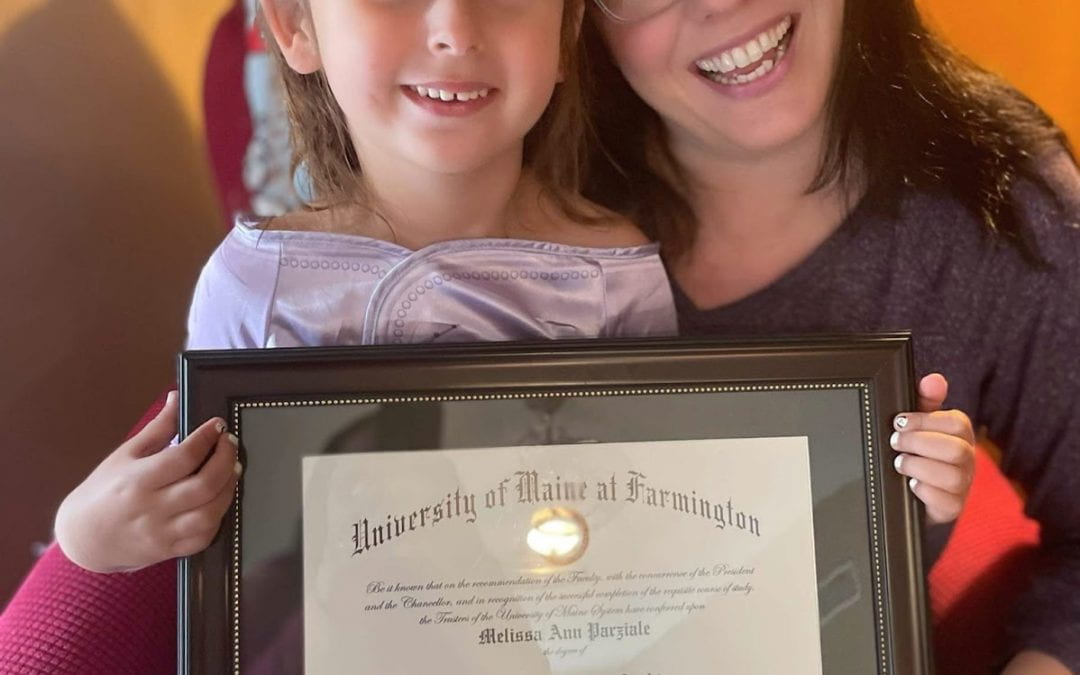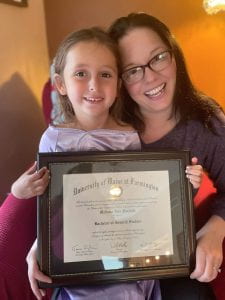Dec 16, 2021 | Feature, News |
By Sophia Turgeon, contributing writer
UMF will be implementing a new curriculum and credit system in the fall of 2023; the Board of Trustees of the University of Maine System approved the campus to alter from a four-credit system to a three-credit system.
This system is one that many University of Maine System schools use, but it comes with a catch. Currently, full-time students take four classes a semester and earn a total of 16 credits (four credits per class). Beginning in September 2023, full-time students will need to take five classes to earn a total of 15 credits (three credits per class).
The overall intention of this change is to match UMF’s curriculum with other University of Maine System schools. This will allow UMF to begin increasing the amount of collaboration between other schools in the system. Additionally, it is also intended to make the transfer of students to UMF easier.
Provost and Vice Principal of Academic Affairs at UMF, Eric Brown, believes that students should not be too alarmed by this change. Program requirements will remain the same for students and the amount of credits needed to graduate will be decreased to accommodate this curriculum. With that being said, UMF faculty is currently reshaping their classes in order to account for the reduced amount of time spent in the classroom.
“No students should be adversely affected by this change in terms of program requirements or path to graduation,” Brown said. “And for many current students the change will likely mean a slightly lower cost for their UMF education, since they will only need 120 rather than 128 credits to graduate,” Brown said.
Brown also admitted that though this shift may be difficult, it will not be disastrous. “… there is time to adjust and anticipate what the changes will look like,” Brown said. “I was here at UMF when we shifted from 3-credits to 4-credits and the adjustment didn’t happen overnight. But at some point it will become a new normal.”
When it comes to students wishing to transfer to UMF, Brown trusts that this credit system will make the transition much smoother. According to Brown, more than half (55%) of the transfer students at UMF that were surveyed confessed that they had lost credits during their transition to UMF. Moreover, 45% reported being required to take more classes than they had initially planned.
“One of the primary reasons for making this change is actually to better align our curriculum with all of the other University of Maine System schools,” Brown said. “This will facilitate one of the System’s strategic goals in the coming years—more multicampus collaboration and more seamless movement for students between and among campuses. But what makes UMF special, in my experience—the close and authentic bonds between faculty and staff and students—will not change. And no one anytime soon will mistake Farmington for Portland or Presque Isle.”
When considering the kind of school UMF is, Brown believes that UMF has always been an amazing university for students to attend, even before the switch to a four-credit system. “UMF was a fantastic school before we switched to a 4-credit curriculum and will continue to be so once we have switched back to a 3-credit model,” Brown said. “It doesn’t mean the transition will be easy or always graceful but the core mission and values of this place will maintain. It really is a rare opportunity to reimagine our best practices collectively as an institution, and to continue to improve upon our well-established record of student success. And I do believe we can emerge stronger as a university once we are on the other side of the work to get us there.”

Dec 16, 2021 | Exclusive, Feature, News, TopStory |
By Charity Webster, contributing writer

(Photo Credit Melissa Pariziale) Melissa and her daughter Mia
Becoming an alumni is what every student wants, but often life throws curve balls at the student which changes the course of life and causes them not to complete the task. UMF has started an amazing opportunity for those students that have struggled to complete their degrees for one reason or another. A program called “Almost Alumni” helps these individuals finally finish their degrees.
Ashley Montgomery is the Assistant to the Dean, Learning and Assessment at UMF, and she is the driving force of Almost Alumni. She also chairs the academic success team which monitors and works with students who are struggling currently at UMF. These “Almost Alumni” individuals are having their transcripts reviewed. If it is possible to complete the degree they will support these individuals through the process.
In the beginning, when Montgomery was attending a meeting with others involved in upper-level education, she really had not put much thought into UMF having a large number of Almost Alumni or stop students (as they are called elsewhere). “Our numbers for adults (24+years old) is very minimal and the majority of the UMF population tends to be of a traditional age,” said Montgomery. Typically, more than half of a class finishes the degree in a normal college timeline. What happens to the rest of them? UMF has stepped up to find them and help support them through what is missing. They are committed to the success of the non-traditional student. They are even willing to pay fines and find resources to pay for books and other college expenses. “They will even research more local colleges for the student to make the transition and completion easier.” said Melissa Parziale, Graduate from Almost Alumni.
“Almost Alumni have delivered 20+ diplomas to students who never had the opportunity to finish their college degree over the last year, each time I was almost in tears from so much joy.” Montgomery said.
Montgomery has sifted through hundreds of past students and selected students that she is approaching to develop a plan to finish. When asked if there was financial support for these students, the answer was there are funds that can help Almost Alumni complete their projected course of study.
Melissa Parziale is one of those students who was approached by Montgomery and only needed two classes to graduate once they reviewed her transcripts and changed her major to General Education. “This phone call and opportunity came at the perfect moment in my life. During COVID, I had lost my job and I was training for Human Resource Management and Leadership, I was so shocked I was receiving an email saying I was close to finishing my Degree” said Parziale. Twenty-eight years after starting her degree at UMF, she finally finished her degree in July of 2021. She proudly hangs it on her wall in her office at a Dental Lab where she is the Director of Human Resources.
For some individuals, graduation is even easier than anticipated. “For some it might be just switching majors and immediately getting a diploma, and for others it might be just one class to completion” Montgomery said. There are a lot of students in the system who have a degree right now and don’t even know it, some just because they never applied for their diploma. Also, they may have been enrolled in the program a while back and the requirements have changed. “These are the easy diplomas,” said Montgomery.
“If I could tell everyone to go back and finish I would, it was what I always wanted to do and Ashley supported me through it every step of the way. Reach out to her and finish,” said Parziale. “I wanted my daughter to know that she can do anything and to never give up on your dreams.”
Contact Information: Almost Alumni Ashley Montgomery Assistant to the Dean, Learning and Assessment at UMF ashleym@maine.edu

Feb 28, 2020 | Feature |
Andrea Swiedom Staff Reporter
Title IX is a federal law that protects individuals at federally-funded institutions like UMF from discrimination including sexual harassment and assault as these impede on a person’s participation in education. When students experience sexual harassment and/or assault on campus, they have the option of reporting their case to mandated reporters who include the majority of faculty, staff, certain students employees, volunteers and peer advocates.
“The only people out of this list who are not mandated reporters are the mental health counselors in the Center for Student Development, the UMF Health Center Staff, and Athletic Trainers when they are working in their Athletic Training capacity,” said Hope Shore, Assistant Director of Student Life & Deputy Title IX Coordinator through an email interview.
When a student reports an incident, the mandated reporter must then inform Shore of the incident.
“I will then reach out to the student to see if they would like to meet,” Shore said. “If the student is interested, I will provide them with information about resources, support, campus policies and procedures and available accommodations.”
Students or anyone concerned with an incident may bypass a mandated reporter by filling out the Title IX Incident Reporting Form online located on MyCampus under the Campus Safety tab or through the UMF Title IX website. This online form allows individuals to file their incident anonymously.

Franklin Hall, Counseling is located on the second floor (Photo courtesy of Andrea Swiedom).
Individuals can also report an incident directly to Shore, which is what a group of students did in Dec. 2018 after encountering several occurrences of sexual harassment from the same individual.
The group of students will remain anonymous for their protection as the Flyer staff is aware of their identities and is confident in the credibility of their stories.
The group created a form for everyone involved to fill out and turn into Shore that described their experiences with this individual. One of the students involved expected the incident to be filed under the group’s name. However, even if a case is recorded with a group, each person’s case is treated as an individual report.
Although students have no obligation to go any further once an incident has been brought to Shore’s attention, one of the members of the group that reported the harassment decided to proceed with the Title IX process. “I can back out at any point, but since I knew others were moving forward, I was going to move forward,” they said.
After the group filed their statement, the student met with Shore one-on-one to continue with the process. “I got this big folder of information and she basically told me that she would make the decision on who she would kind of push my case to next and it ended up going to Christine Wilson,” said the student.
They met with Wilson, the Vice President of Student Affairs, to provide yet another statement that would determine whether or not the case would receive a full investigation. “It felt very official, kind of intimidatingly official,” the student said. “I thought I was just meeting with Christine, but when I got there, there was another woman directly connected with Title IX who was just there for recording.”
The student was allowed to bring a person along for support while giving their official statement. “They were not allowed to say anything, but they were allowed to just be there, which I thought was a really nice thing that you can do,” they said.
The incident was warranted a full investigation at the end of January. They were anxious and afraid while awaiting a verdict as they still had to function in classes, school activities and live on campus around the accused individual.
“I don’t want this to last the entire semester. I just wish they had given me a rough timeline. It’s just, you’ll hear from us when you hear from us,” they said.
Shore’s office also provides students with the option to file a No-Contact order, which prohibits the accused from interacting with the accuser until a verdict is reached. However, the No-Contact order has its limitations.
The student described an interaction they had recently in the Student Center with the individual whom they filed the complaint against, while tabling for a club. “He decided to walk right up to the table to start talking to a person next to me. I asked Hope if this breaks the No-Contact order and she said no. I was having a panic attack and I wasn’t able to do anything about it,” they said.
Whether or not students go through with the Title IX process, there are several support resources available on campus that Shore reviews with students during initial meetings. “[Shore] asked me if I knew what services are available. I kind of knew, but at the same time I didn’t,” the student said. “I still said that I knew because I didn’t want to be there, but at the same time, I know that the counselors in Franklin have a month-long waiting list.”
None of the counselors were available for an interview, but students can visit the counseling services website for more information or visit their office on the second floor of Franklin Hall, which is open Monday through Friday from 8 a.m. to 4:30 p.m. The Counseling Center also provides emergency walk-in hours that students may take advantage of at any time.

Shawna Austin, SAPARS Associate Director (Photo Courtesy of Shawna Austin).
There is also a confidential, free drop-in support service available in room 112 in the Student Center every Friday from 11 a.m. to 1 p.m. through Sexual Assault Prevention and Response Services (SAPARS). “This is a specific time where an advocate can be accessible to answer questions, be a listening ear, and/or work together with students to engage in awareness raising events and/or other projects,” said Associate Director of SAPARS Shawna Austin in an email interview.
SAPARS isn’t affiliated with UMF, but offers an impressive amount of free and confidential support services, including a 24-hour helpline (1-800-871-7741) to assist anyone affected by sexual harassment and/or assault, support groups, and a Sexual Assault Response Team well-versed in legal procedures that will even accompany individuals to police stations.
Dec 8, 2017 | News |
By Devon Hall – Contributing Writer
As the season for intense studying arrives, UMF students may find themselves at a loss when trying to find the place that feels just right. Luckily for them, there is a myriad of places to study around campus with all different kinds of vibes.
A solid place to start is the library. Books, a quiet atmosphere, and a café all make this a prime choice for many students. However, some might not realize just how spacious Mantor Library truly is. UMF junior Brooklyn Brown studies mainly on the first floor of the library by herself.
“I found if I study in groups, we get distracted and don’t get much work done,” Brown said. “It helps me focus more if I just bring what I need here. I can get more studying done.”
Mantor also has the mezzanine hanging out over the first floor, equipped with booths, chairs, and tables. A separate room attached to this space holds a 6-seater group room maintained at a toasty 70°F. The third floor is a designated quiet area. The only noises to be heard are the hum of the heating system hard at work, the occasional clack of the tech help desk keyboard, and muted voices floating up through closed windows from students passing the library. The shades are left open to let natural light filter inside.
Freshman Biology major Natasha says she likes the quiet, empty atmosphere. “Usually there’s just nobody up here,” she said. Sophomore Mecédaidh Phalen also attests to the emptiness. “I work every Saturday and there’s almost never anyone in there when I go upstairs,” Phalen said.
Freshman Secondary Education major Jasper Emory has several favored study spaces, including the library basement and the basement of Scott South. “I like to study in basements,” Emory said. “Basements are better because I’m less likely to run into traffic.”
Jasper also recommends the rainbow lounge in Scott as well as the Bjorn Plaza outside the Education Center in warmer weather. Just be warned, the door locks when it closes.
Other students have their own preferences for study locations. Freshman Creative Writing major Alanna McGinty said, “people are loud,” and she prefers to study at home.
One seemingly undiscovered gem lies in the third floor of Merrill, which is utilized by sophomore Rowan Bagley. “Just keep going up until you can’t find any more stairs that go up,” Bagley said. This lounge space has whiteboards, a calendar, leather chairs in both black and chartreuse, art books, a piano, and a coffee maker.
Along with big rooms with booths and couches, the library has many individual group rooms of different sizes, between small two-person rooms in the basement and bigger rooms or rooms with projectors. Students can schedule time in at http://library.umf.maine.edu/spaces.
Dec 8, 2017 | Feature |
By Alicia Davis, Contributing Writer
CAs in the UMF residence halls are mentally ready to help students during finals week, which is one of the busiest for CAs throughout the entire semester. This is Josh Beckett’s third semester as a CA, this year in Purington. “We have a lot more duty hours because we have to be around to check people out of their rooms,” said Beckett. “The office is typically constantly staffed from 8 p.m. to 11 p.m. For finals week, it’s staffed all day long,” he said. CAs feel they have more to do around campus than other college students, but especially during finals week.
Margaret Fogarty, a CA in Scott North, said, “I think we work all the time, so if I’m busy studying for my exams and someone needs me, I have to stop what I’m doing and help them,” said Fogarty. “I’m a lot busier than the average student, [especially] during this week,” she said.
CAs also have to stay on campus longer than most other students. After finals week is over, CAs have to wait extra time before they can go home. “We stay until all the rooms are checked.We have to come back early in January for spring training,” said Beckett. “This gives us a shortervacation than a typical college student,” he said.
During finals week, CAs have a few extra jobs. “There is a CA on duty throughout the day, in addition to the night shift in order to help people who are checking out,” said Loren Marshall, a CA in Dakin.
Some students have been inspired by the work CAs do. Sage van Eekhout is a CA in Stone, and decided to become a CA starting her sophomore year. “I wanted to be a CA because my freshman year all of my friends were CAs, and I saw the impact they made on myself and others,” she said. “I wanted to be there for someone like they were for me.”
Some residence halls have programs that are run during finals week to help students. “In Scott we have a program called Destress Fest, where there are different activities,” said Fogarty.
“There will be yoga, Just Dance, bubble wrap popping, we have different ways to reduce stress,” she said. Collin Regan is in his third semester as a CA in Scott North. Regan said his favorite thing about being a CA is “making the connections and being there for people. Having the knowledge that I am a resource and I am available is a good feeling,” he said.
These CAs work together to create the feeling of a community on campus and in their residence halls to help students feel at home. CAs are always available to help, whether it is tips on studying for finals or any other stresses in life.



